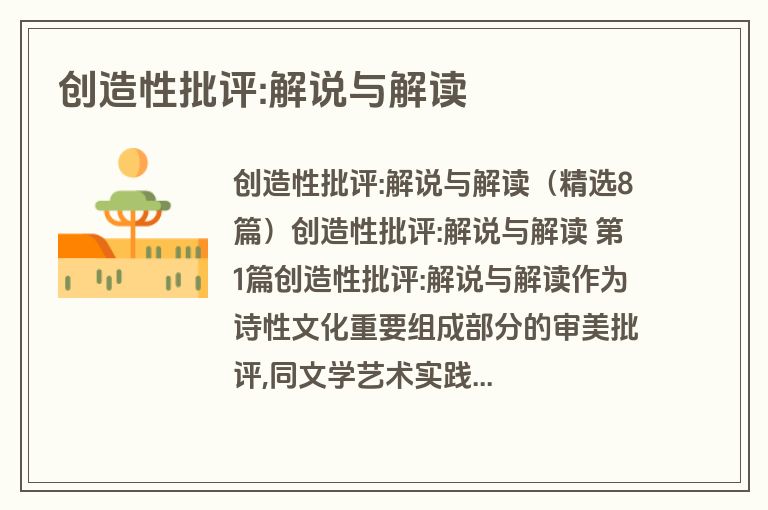现在完成时例句(精选9篇)
现在完成时例句 第1篇
英语过去完成时
基本用法:
(1)表示在过去某一时刻或动作以前完成了的动作,也可以说过去的时间关于过去的动作。即“过去的过去”。可以用by, before等介词短语或一个时间状语从句来表示,也可以用一个表示过去的动作来表示,还可能通过上下文来表示。例如:By nine
o’clock last night, we had got 200 pictures from the spaceship.到昨晚9点钟,我们已经收到200 张飞船发来的图片。
(2)表示由过去的某一时刻开始,一直延续到过去另一时间的动作或状态,常和for, since构成的时间状语连用。例如: I had been at the bus stop for 20 minutes when a bus finally came.当车来的时候,我在车站已等了20分钟。(3)叙述过去发生的事情,在已叙述了过去发生的事情后,反过来追述或补述以前发生的动作时,常使用过去完成时。例如: Mr.Smith died yesterday.He had been a
good friend of mine.史密斯先生昨天去世了。(4)在含有定语从句的主从复合句中,如果叙述的是过去的事,先发生的动作常用过去
完成时。例如: I returned the book that I had borrowed.我已归还了我借的书。(5)过去完成时常常用在told,said,knew,heard,thought等动词后的宾语从句(或间接引语)中,这时从句中的动作发生在主句表示的过去的动作之前。例如: He said that he had known her well.他说他很熟悉她。(6)状语从句:在过去不同时间发生的两个动作中,发生在前,用过去完成时;发生在后,用一般过去时。如when,before,after,as soon as,till/until引导的 例如: When I woke up, it had already stopped raining.我醒来时雨已停了。注意:如果两个动
作紧接着发生,则常常不用过去完成时,特别是在包含before和after的复合句中,因为 这 时从句的动作和主句的动作发生的先后顺序已经非常明确,这时可以用一
般过去时代替过去完成时。例如: After he arrived in England, Marx worked hard to
improve his English.马克思到达英格兰之后,努力提高他的英语水平。
(7)动词think, want, hope, mean, plan, intend等用过去完成时来表示过去未曾实现的想法,希望,打算或意图等。例如: They had wanted to help but could not get there in time.他们本来打算去帮忙,但没有及时赶到那里。
(8)过去完成时还可用在hardly…when…, no sooner…than…, It was the first
(second, etc)time(that)…等固定句型中。例如: Hardly had he begun to speak
when the audience interrupted him.他刚开始演讲,听众就打断了他。时间状语:before,when,after,by+,until, once,had no sooner……than
英语现在完成时
1.现在完成时的“完成用法” 现在完成时的“完成用法”指的是动作发生在过去某一
时刻并已结束,但该动作对现在产生了影响,与现在情况具有因果关系。例如:
He has turned off the light.他已把灯关了。(动作结束于过去,但说明的是现在的情
况--灯现在不亮了。)现在完成时“完成用法”的特点是动作不延续,因此,该时
态只能与表示不定的过去时间状语(如:already,yet,before,recently等)、频度时
间状语(如:never,ever,once等)、包括现在时刻在内的时间状语(如:this morning
/ month /year...,today等)连用。例如: Have you found your pen yet?你已
找到你的钢笔了吗?2.现在完成时的“未完成用法” 现在完成时的“未完成用法
”指的是动作开始于过去某一时刻,一直延续到现在,或可能还要继续下去。例如:He has lived here since 1978.自从1978年以来,他一直住在这儿。(动作起始于1978年,一直住到现在,可能还要继续住下去。)此种用法的句中常需一个表示一段时间的状语(由since或for引导),或表示与现在时刻相连的时间状语(如:up to now,so far)等。例如:I have heard nothing from him up to now.到目前为止我没有他的任何消息。注意:(1)现在完成时的未完成用法只适用于延续性动词,不可用于终止性动词,即瞬间完成或延续时间很短的动词。如:come,go,arrive,leave,join,become,die等。(2)现在完成时常见两种句型:①主语+have / has been+for短语②It is+一段时间+ since从句例如:He has been in the League for three years.或It is three years since he joined the League.他入团已三年了。
现在完成时例句 第2篇
保定七中 马楠
The Present Perfect Tense No.7 Middle School Ma Nan Tools: multimedia Aims: 1.revise the Present Perfect Tense 2.Get Ss to tell the differences between the present perfect tense and the simple past tense Keys: the Present Perfect Tense Difficulties: the usages of the tense Procedures: Step 1.Revision Teacher(lead in): what tenses have we learned for three years? What are they? Today we will revise one of the tenses.First let’s look at these two sentences together.Would you like talk something about them? The present perfect tense.Ask the students to Show the meaning and the structure of the tense.Step 2.Presentation Talk about the tense.Present the present Perfect tense.Get Ss to know the usage of the tense.Past Action, Present result.Get Ss to match the action and the result, make sure that the students can connect the tense with the present result.Get Ss to image the present result, make sure they know the tense is focused on the present result.Get Ss to summarize the formation of the tense and the past participle.Step 3.Teach the tense 1 Ask the students to revise the key words…
Find the clues of the present perfect tense: already, just, ever, never , before , yet…
Show the time and the action: Get Ss to be familiar with the second usage of the present perfect tense.Get Ss to talk and boast with the present perfect tense(II).Get Ss to find the clues: for + a period of time;since + time point;so far;in/during the past / last + a period of time;since + past simple Make sure: 1.We use insistent verbs when we talk about the usage 2.2.The usage of “have /has been to, have/ has gone to” 3.The usage of the momentary and durational verbs 4.What is the difference between the present perfect tense and the simple past tense? Step 4.do the exercises Step5 make a survey and then write a short passage according to their answers Homework: I.hand in the studying plan II.write a short passage of the survey.首先,在上这堂课之前,我就已经进行了课前反思。即-备大纲、备教材、备教学目的、备教学内容及重点难点,备习题、备板书设计,同时更应备学生,即根据自己学生特点,因人施教,因材施教。从激发学生兴趣入手,把知识完全溶入现实生活之中,为课堂教学做好充分的准备,奠定坚实的基础。
本节课,总体来说,教学内容较成功地完成了大纲要求。教学内容的呈现方式与技巧能充分调动起学生学习的的兴奋点,从而使教学目标的达成,学生主动参与的现象也比较突出,并通过引入一些课堂之外的英语知识,对学生发散思维和创新思维的开发起到了一定的促进作用,整堂课我都尤其注意与学生的情感沟通,在课堂上通过教学反思不断地构建师生、生生合作与互动的情景,重视高尚的生命情感教育,做到人德教育、人德合一。
现在完成时 第3篇
Form: [has/have+past participle]
Examples:
USE 1 Unspecified Time before Now
We use the Present Perfect to say that an action happened at an unspecified time before now. The exact time is not important. You CANNOT use the Present Perfect with specific time expressions, such as: yesterday,one year ago, last week, when I was a child, when I lived in Japan, at that moment, that day, and one day.We CAN use the Present Perfect with unspecific expressions, such as: ever, never, once, many times, several times, before, so far, already, and yet.
Examples:
Have you read the book yet?
Nobody has ever climbed that mountain.
I’ve already finished my homework.
USE 2 Duration from the Past until Now (Non-Continuous Verbs)
With Non-Continuous Verbs, we use the Present Perfect to show that something started in the past and has continued up until now.“For five minutes”,“for two weeks”, and“since Tuesday”are all durations which can be used with the Present Perfect.
Examples:
I have had a cold for two weeks.
She has been in England for six months.
现在完成进行时和现在完成时辨析 第4篇
下面我们先来做一组习题热热身吧!
1. —I am so tired.
—No wonder. You for a whole day.
A. work
B. are working
C. have been working
D. have worked
2. —We’ve spent too much money recently.
— Well, it isn’t surprising. We _______ around all the time.
A. are shopping
B. have shopped
C. were shopping
D. have been shopping
3. I have to see the doctor because I ______ a lot from headache lately.
A. have been suffering
B. was suffering
C. have suffered
D. suffer
Keys: C D A
以上几个题同学们做对了吗?是不是对于两个时态有点混淆不清呢?下面我就针对两个时态的不同之处做个详尽的讲解。
一、现在完成进行时和现在完成时的核心含义
1. 现在完成进行时的构成形式是have/has been doing sth.,一般译为“一直在做某事”。现在完成进行时没有被动语态,它强调动作在从过去到现在某一段时间内持续进行,强调动作的持续时间,动词必须是延续性动词。现在完成进行时常与all the time, all the afternoon, the whole week等时间状语连用。例如:
The CPI in China has been rising. 中国的居民消费价格指数一直在上升。(强调动作持续)
2.现在完成时表示动作发生在过去,完成在过去,其结果或影响仍存在。重点为“已经做过了某事”,但是并不强调这一动作在持续不停地进行。现在完成时常与already, yet, so far, recently等时间状语连用。例如:
Xi Jinping has paid his fifth visit to the USA. 习近平已经完成了他对美国的第五次访问。(强调已经完成)
二、现在完成进行时和现在完成时比较
两者相比较,现在完成进行时往往具有3个特点:
1. 未完结性
一般的现在完成时通常具有结果含义(完结性),而现在完成进行时则常常具有未完结含义。如:
I have cleaned the classroom.我把教室打扫干净了。(教室已经打扫干净)
I’ve been cleaning the classroom.我一直在打扫教室。(可能尚未打扫完教室)
例1(2010江苏卷)—Why, Jack, you look so tired!
—Well, I _______ the house and I must finish the work tomorrow.
A. was painting
B. will be painting
C. have painted
D. have been painting
分析 D。 句意:杰克,你为什么看起来如此疲惫?我一直都在粉刷房子,并且我明天必须完成。根据句意可知,杰克一直在粉刷房子,动作未完结,并且杰克会继续粉刷,强调动作持续,故采用现在完成进行时态。C项为现在完成时,强调过去的动作已经完成及对现在的影响,而杰克显然还没有刷完房子,故C项不符合语境。
2. 连续性或重复性
现在完成进行时常常用于表示延续至今的连续性或重复性动作。
Jack have been calling Lucy every night for the last week. 上星期,杰克每天晚上都给露西打电话。
I’ve been knocking. I don’t think anybody’s in. 我一直在敲门。我想屋里没人。
例2 (2009四川卷)Excuse me, Marcia, a reporter from Vanity Fair _______ all day. Could you speak to her now?
A. phones B. has phoned
C. has been phoning D. phoned
分析 C。 句意为:对不起,玛西娅,一位来自Vanity Fair的记者一整天都在打电话,你现在能和她通话吗?时间状语all day表示过去开始的动作一直持续进行到现在,记者一整天肯定是数次打电话,体现了连续性和重复性的特点,故用现在完成进行时。
3. 常带有感情色彩
说话人往往带有赞许、埋怨等明显的感情色彩。
Meng Peijie has been looking after her paralysed adoptive mother with great care for 12 years. We all admire her very much. 孟佩杰12年来一直悉心照顾瘫痪的养母,我们都很钦佩她。(赞许的感情色彩)
I’ve been waiting for an hour, but he still hasn’t turned up. 我都等了一个小时了,但是他还未露面。(抱怨的感情色彩)
例3 (2008北京西城抽样) —I wonder if you could go with me to the cinema.
—Don’t disturb me. I ______ a composition all the morning and haven’t finished it yet.
A. write
B. was writing
C. have written
D. have been writing
分析 D。 根据答语的第二句可知答话人整个上午都在写作文,现在还没有写完,所以用现在完成进行时,体现了未完结性的特点,表示动作从过去一直持续到现在,而且还可能继续下去。并且由“Don’t disturb me”可以明显感觉到答话人抱怨的感情色彩。而现在完成时强调对现在造成的影响或结果,不表示动作的持续,因此C项不正确。
巩固练习
1. (2010湖南卷) I’m tired out. I ______ all afternoon and I don’t seem to have finished anything.
A. shopped
B. have shopped
C. had shopped
D. have been shopping
2. (2010辽宁卷) Joseph to evening classes since last month, but he still can’t say“What’s your name?” in Russian.
A. has been going B. went
C. goes D. has gone
3. I wonder if John has forgotten my number, I _______ him to call me for the past two hours.
A. was expecting
B. have expected
C. have been expecting
D. expected
4. —Sorry for being late. I was held up in the traffic.
—It’s all right. I _______ the newspaper, anyway.
A. am reading
B. read
C. have been reading
D. have read
5. Please stop to have a rest. You _______ the washing machine the whole morning.
A. have repaired
B. were repairing
C. have been repaired
D. have been repairing
现在完成时说课 第5篇
第十九周第九单元复习课说课
我主讲的题目是现在完成时,我把整个教学环节分为五部分:教材分析、学生分析、教学准备、设计理念、教学流程.一、教材分析 1语法 现在完成时
2句型: 和have /has+V过去分词 3重点与难点:现在完成时的用法
二、学生分析
我所教的八年级(17,18)两个班的学生,他们的共同的特点是两极分化严重,部分学生自制力差,学习的主动性差,缺乏自信心,见于这种情况,我尽量在教学中,多设置一些情境,使他们都参与到活动中来,在活动中适时的对他们进行思想教育.三、教学准备
1学生课前活动安排:复习已学过的现在完成进行时的用法, 2课前准备:利用精美的图片,制作课件, 来吸引学生,使他们更有积极性.四、教学流程与设计理念 关于现在完成时的构成与用法
(1)现在完成时的构成:have / has + 过去分词
如:work的现在完成时的肯定式为: have / has worked 否定式为: have/ has not worked(2)现在完成时的用法:
现在完成时例句 第6篇
1.概念:经常、反复发生的动作或行为及现在的某种状况。
2.时间状语:always, usually, often, sometimes, every week(day, year, month...), once a week, on Sundays,3.基本结构:动词 原形(如主语为第三人称单数,动词上要加(e)S)
4.否定形式:am/is/are+not;此时态的谓语动词若为行为动词,则在其前加don't,如主语为第三人称单数,则用doesn't,通常还原行为动词。
5.一般疑问句:把be动词放于句首;用助动词do提问,如主语为第三人称单数,则用does,同时,还原行为动词。
6.例句:It seldom snows here.He is always ready to help others.Action speaks louder than words.二、一般过去时:
1.概念:过去某个时间里发生的动作或状态;过去习惯性、经常性的动作、行为。
2.时间状语:ago, yesterday, the day before yesterday, last week(year, night, month…), in 1989, just now, at the age of 5, one day, long long ago, once upon a time, etc.3.基本结构:be动词;行为动词
4.否定形式:was/were+not;在行为动词前加didn't,同时还原行为动词。
5.一般疑问句:was或were放于句首;用助动词do的过去式did 提问,同时还原行为动词。
6.例句:She often came to help us in those days.I didn't know you were so busy.三、现在进行时:
1.概念:表示现阶段或说话时正在进行的动作及行为。
2.时间状语:now, at this time, these days, etc.3.基本结构:am/is/are+doing
4.否定形式:am/is/are+not+doing.5.一般疑问句:把be动词放于句首。
6.例句:How are you feeling today?
He is doing well in his lessons.四、过去进行时:
1.概念:表示过去某段时间或某一时刻正在发生或进行的行为或动作。
2.时间状语:at this time yesterday, at that time或以when引导的谓语动词是一般过去时的时间状语等。
3.基本结构:was/were+doing
4.否定形式:was/were + not + doing.5.一般疑问句:把was或were放于句首。
6.例句:At that time she was working in a PLA unit.When he came in, I was reading a newspaper.五、现在完成时:
1.概念:过去发生或已经完成的动作对现在造成的影响或结果,或从过去已经开始,持续到现在的动作或状态。
2.时间状语:recently, lately, since…for…,in the past few years, etc.3.基本结构:have/has + done
4.否定形式:have/has + not +done.5.一般疑问句:have或has提前
6.例句:I've written an article.It has been raining these days.六、过去完成时:
1.概念:以过去某个时间为标准,在此以前发生的动作或行为,或在过去某动作之前完成的行为,即“过去的过去”。
2.时间状语:before, by the end of last year(term, month…),etc.3.基本结构:had + done.4.否定形式:had + not + done.5.一般疑问句:had放于句首。
6.例句:As soon as we got to the station, the train had left.By the end of last month.We had reviewed four books七、一般将来时:
1.概念:表示将要发生的动作或存在的状态及打算、计划或准备做某事。
2.时间状语:tomorrow, next day(week, month, year…),soon, in a few minutes, by…,the day after tomorrow, etc.3.基本结构:am/is/are/going to + do;will/shall + do.4.否定形式:was/were + not;在行为动词前加won't,同时还原行为动词。
5.一般疑问句:be放于句首;will/shall提到句首。
6.例句:They are going to have a competition with us in studies.It is going to rain.八、过去将来时:
1.概念:立足于过去某一时刻,从过去看将来,常用于宾语从句中。
2.时间状语:the next day(morning, year…),the following month(week…),etc.3.基本结构:was/were/going to do;would/should + do.4.否定形式:was/were/not + going to + do;would/should + not + do.5.一般疑问句:was或were放于句首;would/should 提到句首。
现在完成时的句子 第7篇
现在完成时的句子
1、Have you ever traveled on a plane?
你坐飞机旅行过吗?
2、Have you ever been abroad?
你出国过吗?
3、I’ve just finished reading the book、
我刚读完书。
4、I’ve never been there、
我从来没去那里。
5、I’ve already been there twice、
我只去过那里两次。
6、Who has been to Hawaii? None of us has、
谁去过夏威夷?没人去过。
7、Has anybody water-skied before?
有人之前滑过水吗?
8、How long have you been here in Sydney?
你来悉尼多久了?
9、I know you’ve come to see your father、
我知道你来看你的.爸爸。
10、You’ve learnt surfing from him, haven’t you?
你从他那里学的滑水,不是吗?
11、Have you ever been to Hawaii?
你去过夏威夷吗?
12、He has been in Honolulu ever since、
他从那以后就在檀香山。
13、I have already won first prize in the city surfing competition、
我已经在城市的冲浪比赛中获得了第一名。
14、I’ve been surfing every day、
我每天都冲浪。
15、I’ve been here for two weeks already、
我已经在这里呆了两周了。
16、How many songs has he learned so far?
他到目前为止学了多少歌了?
17、How long have you been a member of Greener China?
你成为绿色中国的一员多久了?
18、I’ve been with Greener China for a year、
我跟随绿色中国一年了。
19、What have you done since you joined Greener China?
你加入绿色中国后都做了什么?
20、Have you ever thrown any litter onto the ground?
你有没有往地上扔过东西?
21、If your answers are “No”, it means that you have already helped protect our environment、
如果你的回答是“否”,它意味着你已经帮助保护了我们的环境。(www.Fwsir.com)
22、Have I ever picked up some rubbish and thrown it into a dustbin?
我有没有把垃圾捡起来扔进垃圾筒呢?
23、Have I ever collected waste paper or bottles for recycling?
我有没有为回收而收集废旧纸张或瓶子呢?
24、Have I ever planted any trees or flowers in or near my neighbourhood?
我有没有在社区附近种过树或花呢?
25、If your answers are “Yes”,it means that you have already done something useful to improve the environment、
如果你的回答是“是”,它意味着你已经为保护环境做了些有用的事。
26、After you have finished the questionnaire, you may decide if your friend is doing very well in protecting the environment、
你完成调查问卷后,你可以决定你的朋友是否在保护环境方面做得很好。
27、Has everyone in your class written a letter to a factory to ask them to stop pouring dirty water into the river or lake nearby?
你们班的人有没有给工厂写信让他们停止向附近的河或湖排放污水?
28、How long have you worked in this library?
现在完成时的四大考点 第8篇
一、考查其构成
“助动词have (has)+动词的过去分词”构成现在完成时。例如:
1.Kate's never seen Chinese films,_?
A.hasn't she B.has she
C.isn't she D.is she
简析:陈述部分含否定词never,附加疑问句部分要用肯定式。又因Kate's是Kate has的缩写,故选B项。
2.His uncle has already posted the photos to him.(改为否定句)
His uncle_posted the photos to him_.
简析:already常用在肯定句中,yet常用在否定句和疑问句中,故填hasn’t,yet.
3.Ann has gone to Shanghai.
So______her parents.
A.has B.had
C.did D.have
简析:在“so+助动词/系动词/情态动词+主语”结构中,时态应与前句保持一致,又因后句的主语her parents是复数,故选D项。
二、考查其用法与标志词
(1)当句中有never,ever,just,already,yet,before等词时,常用现在完成时。例如:
1.—Mum,may I go out and play basket-ball?
—______you______your homework yet?
A.Do,finish B.Are,finishing
C.Did,finish D.Have,finished
2.—______you______anywhere before?
—Yes,but I can't remember where I_____.
A.Did,surt;surfed
B.Have,surfed;surfed
C.Did,surf;have surfed
D.Have,surfed;have surfed
简析:根据yet和before可知,应用现在完成时,故第1题选D项,第2题选B项。
(2)当句中有时间状语“for+时间段”或“since+时间点”以及“since+从句”时,主句常用现在完成时,而且谓语动词必须是延续性动词,若是非延续性动词,要改为延续性动词或表状态的词(短语)。例如:
I.His brother has been to Stone Forest twice______he came to Yunnan.
A.after B.before
C.since D.for
简析:主句用的是现在完成时,而从句用的是一般过去时,故选C项。
2.Tom______the CD plaver for two weeks.
A.has lent B.has borrowed
C.has bought D.has had
简析:A、B、C三项均为非延续性动词。在肯定句中不与表时间段的短语连用,故选D项。
3.1______a letter from him since he left.
A.didn't receive B.haven't got
C.didn't have D.haven't heard
简析:根据since从句可知应用完成时态,应排除A、C两项,hear from sb.相当于receive/get/have a letter from sb.意为“收到某人的来信”,故选B项。
三、考查have/has been(to,in)/have/has gone(to)的区别
1—Have you ever______Shanxi to see the Terra Cotta Warriors?
—Yes,I have.
A.went to B.gone to
C.been in D.been to
简析:根据句中的have可知此句是现在完成时态,故排除A项,B项have gone to表示人不在说话的地方,显然不符合题意,C项意为“一直呆在某地”,D项意为“去过某地”,符合题意,故选D项。
2.My parents______Shandong for ten years.
A.have been in B.have been to
C.have gone to D.have been
简析:本题句中有“for+时间段”结构,据此可排除B,C两项,这两项分别意为“去过某地”和“去了某地”不合题意,D项缺介词,故选A项。
四、考査现在完成时与其它时态的联系和区别
1.Sun's aunt has gone there for ten years.(改成正确的句子)
简析:非延续性动词与时间段连用时,除了把非延续性动词改成延续性动词外,还可把时态改为一般过去时或借助句型“It's+时间段+since+从句”进行句子转换。
故答案为:Sun's aunt has been there for ten years.
Sun’s aunt went there ten years ago.
It's ten years since Sun's aunt went there.
2.Susan had been in this city for more than ten years.(改为同义句)
______more than ten years______Susan______to this city.
简析:根据上题的分析,且since引导的从句要用一般过去时,故填It's,since,came。
3.1 won't go to the concert because I______my ticket.
A.I ost B.don't lose
C.have lost D.is coming
现在完成时入门 第9篇
一、用法
1.意义:(1)现在完成时表示过去发生或已完成的某一动作对现在造成的影响或结果。也就是说,现在完成时虽与过去有关,但实际上着重的是对现在的影响或结果。例如:
I have bought two new books.
我买了两本新书。(“买”这一动作发生在过去,对现在造成的结果是:拥有两本新书)
(2)现在完成时还可以表示过去发生的动作一直持续到现在, 有可能还会持续下去。例如:
I’ve been here since February.
我从二月份起就在这儿了。(“在”这个动作发生在过去,但一直持续到现在)
2.标志词:与现在完成时连用的常用副词有:already,yet,just, never, ever, before等。例如:
I have already sung this song.
我已唱过这首歌了。
He hasn’t known this news yet.
他还不知道这个消息。
小提示:already,just多用于肯定句中,yet, ever, never多用于疑问句和否定句中。例如:
He has just had his meal.
他刚吃过饭。
Have you ever read this story?
你曾读过这个故事吗?
二、构成
1.肯定式:由“have / has +过去分词”构成。例如:
We have seen that film.
我们已经看过那部影片了。
She has gone home.
她已经回家去了。
小提示:该句式中的have或has是助动词,has用于第三人称单数,其它人称一律用have。译成汉语时,往往用“已经”“过”或“了”等。
2.否定式:由“have / has +not +过去分词”构成。have,has与not可以分别缩写为haven’t, hasn’t。 例如:
He hasn’t come back yet.
他还没有回来。
小提示:现在完成时的否定句末往往加yet,时常译为“还没有……”。
3.一般疑问句:将have/ has提到主语前,简略答语为:“Yes, 主语+ have/ has(肯定回答)” 或“No, 主语+ haven’t / hasn’t(否定回答)”。例如:
—Have you ever made cakes?
—Yes, I have. / No, I haven’t.
——你做过蛋糕吗?
——是的,我做过。/不,我没做过。
—Has she eaten that orange?
—Yes, she has. / No, she hasn’t.
——她吃了那个橘子了吗?
——是的,她吃了。/不,她没吃。
小提示:现在完成时的一般疑问句往往在句末加yet。汉语译为“……过吗?”或“还有……吗?”等。例如:
—Has Jim finished his homework yet?
—No, not yet.
——吉姆完成家庭作业了吗?
——不,还没有。
【配套练习】
Ⅰ. 用括号内所给动词的适当形式填空。
1. I ______ just ______ (finish) my homework.
2. You won’t know if it fits you until you ______ (try) it on.
3. How long ______ you ______ (stay) at home?
4. It’s said that he _______ (be) sent to Australia to improve his English.
5. Tom ______ (marry) for 40 years.
6. Her mother _______ (go) to Shanghai. She ______ (leave) this morning.
7. She ______ (not read) the book before.
8. My sister _______ (walk) to school every day last year.
9. _______ he ______ (wait) for an hour yet?
10. ______ you ______ (know) her since then?
Ⅱ. 同义句转换。
1. Do you have any computers?
_______ you ______ any computers?
2. I have already been here for five years.
I have been here _______ five years _______.
3. Where did you go just now?
Where ______ you ______?
4. I came to this school two weeks ago.
I ______ ______ ______ this school ______ two weeks.
5. The supermarket has been open for three months.
______ three months ______ the supermarket _______.
Ⅲ. 下列各句均有一处错误,请指出并改正。
1. The film has begun for half an hour.
2. How long has he joined the Party?
3. The baby has caught a bad cold since last night.
4. I’m sure that we have seen the film ago.
5. Mr Green has come to this city since 1998.
Ⅳ. 汉译英。
1. 汤姆去过迪斯尼乐园吗?
2. 蒂娜从没去过太空博物馆。
3. 你听说过米老鼠和唐老鸭吗?
4. 你离开学校多久了?
5. 他姐姐去游乐园了。
Key:
Ⅰ.1. have, finished 2. havetried 3. have, stayed 4. has been5. has been married6. has gone, left7. hasn’t read 8. walked 9.Has, waited 10. Have, known
Ⅱ. 1. Have, got2. since, ago 3. have, been4. have been in, for5. It’s, since, opened
Ⅲ.1. has begun→has been on2. joined → been in3. has caught → has had 4. ago → before5. come to → been in
Ⅳ.1. Has Tom ever been to the Disneyland?
2. Tina has never been to the space museum.
3. Have you ever heard ofMickey Mouse and Donald Duck?
4. How long have you been away from school?







